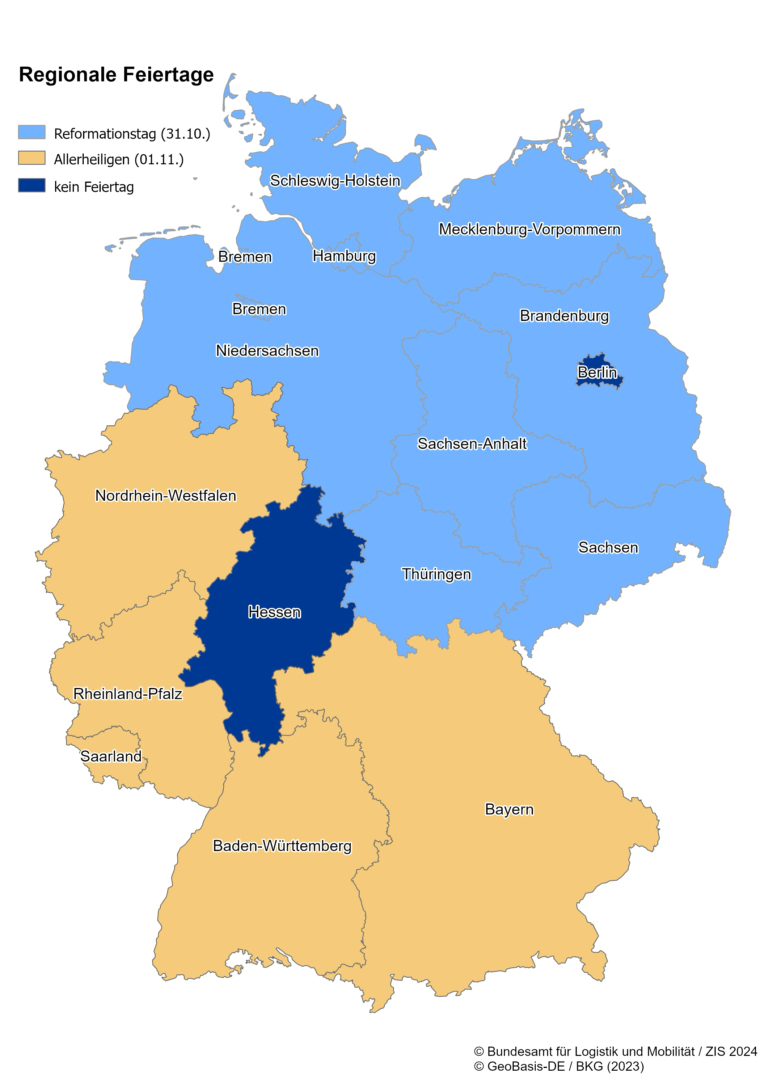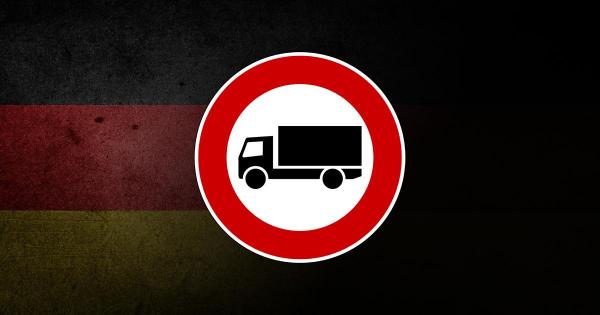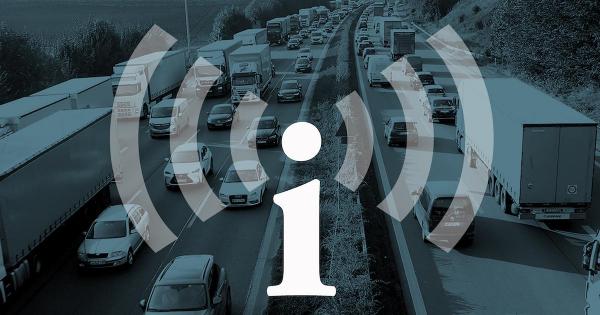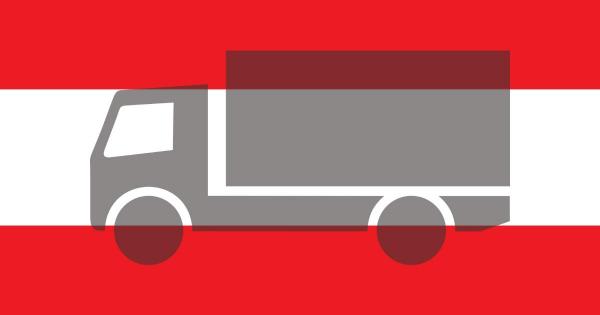
Germany: all you need to know about driving bans on 31 October and 1 November
HGV driving bans in Germany on these two days may be rather confusing, which is not surprising given the fact that both holidays are celebrated only in selected federal states, and the hours of the bans vary depending on the region. However, to make life easier for truck drivers, the authorities introduce derogations that allow them to cross the state where the ban is in effect without having to stop for two days.
Basic facts:
❌ Thursday, October 31, Reformation Day is a public holiday in the states of Brandenburg, Bremen, Hamburg, Mecklenburg-Vorpommern, Lower Saxony, Saxony, Saxony-Anhalt, Schleswig-Holstein and Thuringia. The ban is in effect from 00:00 to 10:00 PM, except for Lower Saxony, where it starts from 06:00 and lasts until 10:00 PM.
❌ Friday, November 1, All Saints’ Day is is a public holiday in the states of Baden-Württemberg, Bavaria, North Rhine-Westphalia, Rhineland-Palatinate and Saarland. The ban is in effect from 00:00 to 22:00, except in North Rhine-Westphalia, where it starts from 06:00 and lasts until 10:00 PM.
Exceptions in Lower Saxony and North Rhine-Westphalia
Until 2025, special regulations regarding Reformation Day and All Saints’ Day apply in the states of Lower Saxony and North Rhine-Westphalia. Reformation Day (October 31) is a public holiday in Lower Saxony,, while All Saints’ Day (November 1) is a public holiday in North Rhine-Westphalia.
To make sure that lorry drivers traveling through Lower Saxony and North Rhine-Westphalia are not banned from driving for 2 days in a row, the hours when the ban is in effect have been changed. On both holidays, the ban will last from 6:00 AM to 10:00 PM.
In addition, both federal states allow lorries to use the main transit routes along A 1, A 2, A 30, A 31 and A 33 during a public holiday when the ban is in effect. Listed below are motorway sections where HGV traffic is allowed between 6:00 AM and 10:00 PM on public holidays in Lower Saxony or North Rhine Westphalia:
➡️ A1 – from the Lotte/Osnabrück junction to the border of North Rhine-Westphalia and Lower Saxony near the Osnabrück-Nord junction and in the opposite direction.
➡️ A2 – From the Bad Oeynhausen junction to the border between Lower Saxony and Saxony-Anhalt and in the opposite direction.
➡️ A 30 – from the Bad Bentheim border crossing to the Bad Oeynhausen intersection with the A2 motorway and in the opposite direction.
➡️ A31 – from the Schüttorf motorway junction to the border between Lower Saxony and North Rhine-Westphalia and in the opposite direction.
➡️ A33 – from the Osnabrück-Süd motorway junction to the Dissen-Süd junction and in the opposite direction.
Additional derogation in North Rhine-Westphalia
In contrast to North Rhine-Westphalia, there is no driving ban on All Saints’ Day in the state of Hesse. For practical reasons, drivers travelling through North Rhine-Westphalia via the shortest route between two points in Hesse will not be fined for violating the driving ban on All Saints’ Day. Drivers should use the designated “transit section” of the A44 motorway (junction 65), from the state border at kilometre 43.2 to the state border at kilometre 28.4.
Transit traffic to and from the state of Berlin on Reformation Day (31.10)
In contrast to the neighbouring state of Brandenburg, there is no driving ban on Reformation Day in the state of Berlin. By virtue of an agreement with the states of Brandenburg, Mecklenburg-Vorpommern, Saxony, Saxony-Anhalt and Thuringia, HGV traffic on 31 October is permitted along A2, A20, A24, A4, A9, A10, A11, A12, A13, A14, A15, A17, A19, A38, A71, A72, A73, A111, A113, A114, A115, A117, A143, provided the place of departure or the place of destination is located in the state of Berlin.
Trucks are not allowed to leave the designated motorways in the states where the holiday driving ban is in effect, unless the motorway is completely closed following an accident or owing to road works. In such cases, trucks are allowed to follow designated diversion routes. If no diversion is indicated, drivers should use the shortest route to the nearest motorway junction. A truck is also allowed to leave the motorway in case of a mechanical failure. It should then be towed to the nearest suitable place where it can be safely parked.


German Unity Day on October 3 with HGV restrictions also in Austria and Luxembourg
Since German Unity Day is a nationwide public holiday, there is a driving ban for vehicles with a GVW over 7.5 tons, which is in effect along the entire road network from 00:00 to 10:00 PM.
⭕ Germany – the HGV driving ban will apply from 00:00 to 10:00 PM along the entire road network in all federal states. For a list of exceptions, click HERE.
In order to prevent traffic jams at the borders, Austria and Luxembourg have also introduced restrictions on HGV traffic on this day.
⭕ Austria – the HGV driving ban will be in effect on the A13 motorway towards Germany from 00:00 to 10:00 PM. For a list of exceptions, click HERE.
⭕ Luxembourg – the HGV driving ban will be in effect on all roads leading to Germany between 00:00 and 9:45 PM. For a list of exceptions, click HERE.

Czechia: D1 reopened, with a speed limit on around exit 370
The section of D1 motorway near Ostrava – Svinov has been reopened, which means that traffic on the motorway can continue as usual, except for a 60kph speed limit ona 2-kilometer section around exit 370.
The I/60 road has also been reopened in the morning. However, in two places before and at the beginning of Vápenná, traffic will have to continue on the hard shoulder until repairs on the main road have been completed.
Similar difficulties can be expected on the I/44 in the Česká Ves area and the I/46 in Opava, where the bridge is still closed and only accessible to pedestrians.
Oznacz jako wykorzystany

Poland: the bridge on the Oder in Krosno Odrzańskie closed to HGV traffic
In response to a request from the authorities of Krosno Odrzańskie, the Ministry of Infrastructure has introduced a temporary ban for HGV traffic on the bridge across the Oder river.
The ban came into effect at 11:00 p.m. on September 19, and applies to all vehicles in through traffic.
The measure has been introduced to improve traffic flow and reduce traffic jams in connection with the expected flood wave on the Oder. Diversions have been designated, and drivers are asked to follow the new road signage.
This ban will also facilitate the transport of materials such as sand and water-blocking walls, which are used to protect the town from the upcoming flood wave. Emergency service vehicles are exempt from the ban.

Traffic disruptions in Belgium, Germany, France and the RD66 between France and Spain
Traffic disruptions are expected in Belgium (Liège E25-E40/A602 connection and in the Ruppel tunnel on the A12), in Lower Saxony and Saxony-Anhalt, Dresden, in France on the RN134 leading to the Somport tunnel and on the section of the RD66 between France and Spain (for special transports).
Belgium
⭕ Due to maintenance work, the Liège E25-E40/A602 connection between junction 35 “Avroy/Laveu” and junction 39 “Chênée” (in both directions) will be completely closed from 10:00 PM (gradual closure from 8:30 PM) until 6:00 AM (gradual reopening from 5:00 AM) on the following nights:
– from Sunday, 15 September, to Monday, 16 September,
– from Monday, 16 September, to Tuesday, 17 September,
– from Tuesday, 17 September, to Wednesday, 18 September,
– from Wednesday, 18 September, to Thursday, 19 September,
– from Thursday, 19 September, to Friday, 20 September,
– from Monday, 23 September, to Tuesday, 24 September.
Traffic will be diverted via the A604, routes S1 and B.
⭕ Work in the Ruppel Tunnel (A12) towards Brussels will begin on Monday, 16 September. In order to minimise disruptions to traffic, work will be carried out at night. From Monday evening to Saturday morning, between 8:00 PM and 6:00 AM, the tunnel tube in the direction of Brussels will be closed. Traffic in both directions will be possible via the second tube on narrowed lanes. In February 2025, preparations will start in the tunnel tube towards Antwerp. The work will last around 120 nights and, if the conditions are favourable, will be completed by the end of April 2025.
Germany
⭕ The sugar beet harvest has started in Lower Saxony and Saxony-Anhalt, which means that trucks and tractors pulling trailers with sugar beets will be frequently travelling on many roads in the region. As a result, traffic disruptions can be expected, especially on national and county roads. During the sugar beet harvest, caution is advised, especially near the sugar factories in Clauen, Klein Wanzleben, Könnern, Nordstemmen, Schladen, Uelzen and Zeitz.
Advice for drivers:
• Increase your vigilance! Beetroot can lie anywhere on the road or fall off a truck right in front of your car. If you keep a greater distance, you will be able to react in time.
• Allow more time for your commute (at least 15 to 30 minutes).
• Beetroot dirt makes roads greasy and slippery during rain. So take your foot off the gas.
• Only overtake when there is definitely no vehicle coming from the opposite direction.
• Be even more careful in darkness and fog. Beetroot transports also take place at night.
⭕ For reasons still unknown, the Charles Bridge in Drsden partially collapsed in the early morning on September 11. A 100-meter section of the bridge section used by trams fell into the Elbe River. Emergency services have closed the entire area around the bridge and the bridge itself.
⚠️Teilabschnitt der #Carolabrücke in #Dresden eingestürzt! Der gesamte Bereich um die Carolabrücke, die Bundeswasserstraße #Elbe sowie der #Elberadweg und das #Terrassenufer sind für den Verkehr komplett gesperrt!

Salzburg: The HGV driving ban the B159 lifted until June 2025
Owing to the general renovation of the Ofenauer, Hiefler, Brentenberg, Zetzenberg and Helbersberg tunnels on the A10 motorway, which ism scheduled to take place from 9 September 2024 to 26 June 2025, the driving ban for vehicles with a GVW of over 7.5 t on the B159 Salzachtal Straße from km 34.4 +35m to km 35.2 +64m (in the village of Tenneck) will be lifted for throughout the period.
As a result of the renovation, only one lane will be available for traffic in each direction along this 14-kilometer section of the A10. In addition, a driving ban for vehicles wider than 3.20 m will come into effect along the entire section of the A10 affected by the renovation work. Special transports that cannot be diverted (e.g. to the Liebherr plant) will have to use the B159 Salzachtal Straße. The A10 exit will be closed for the entire renovation period. Depending on circumstances (e.g. traffic volume, the dosing of HGV traffic before the Helbersberg tunnel or the Ofenauer and Hiefler tunnels), the A10 exits towards Werden and Pass Lueg towards Salzburg must be closed. These disruptions will cause serious restrictions for regional commercial traffic (e.g. to the Sulzau industrial area, where there are gravel factories, asphalt plants, etc.). Experience from previous renovations of the A10 is another argument in favour of lifting the driving ban. Since the motorway exit closures are likely to increase travel times on this route, trcuks will be allowed to travel use the B159 Salzachtal Straße through the village of Tenneck for the duration of the renovation.

Austria: exits on the A10 motorway blocked to prevent drivers from avoiding traffic jams
The restrictions apply to vevicles with a GVW over 7.5 tons from 9 to 29 September with the exception of transports destined for Salzburg or other destinations in Austria. The restrictions listed below are an extension of the ban that was already in force during the summer months.
⭕Salzburg district-surrounding area – no exit from the A10 motorway:
• onto the B159 road – Salzachtal Straße towards Hallein from km 0.0+4m
• onto Ahornstraße at the intersection with the B160 – Berchtesgadener Straße towards Niederalm
• onto Neu-Anifer Straße at the intersection with the intersection with the B160 – Berchtesgadener Straße towards Niederalm
• onto Kirchenstraße at the intersection with the B159 – Salzachtal Straße towards Grödig
• onto Schloss-Lasseregg-Straße at the intersection with the B159 – Salzachtal Straße towards Grödig.
⭕Tennengau district – no exit from the A10 motorway
• at the Puch-Urstein exit (exit 11) towards Villach, to the Urstein Süd roundabout, to the right
• at the Hallein exit (exit 16) towards Villach on the L 107 Wiestal Landesstraße (roundabout)
• at the Golling-Abtenau exit (exit 28) towards Villach, on the B 159 Salzachtal Straße at km 21.290
• at the Kuchl exit (exit 22) onto the B 159 Salzachtal Straße at km 14.356. Exit towards Hallein on the right, station in the middle of the intersection; Exit towards Kuchl on the right on the green island between the two turning directions.
⭕Pongau district – no exit from the A10 motorway:
• at the Werden exit (exit 43) onto the B159 Salzachtal Straße
• at the Pfarrwerfen-Werfen exit (exit 44) onto the L229 Affenwenger Landesstraße
• at the Pongau junction (exit 46) onto the L276 Kreuzberg Landesstraße
• at the Lammertal-Hüttau exit (exit 56) onto the B166 G Schütt Straße
• at the Eben im Pongau exit (exit 60) onto the B99 Katschberg Straße
• at the Altenmarkt im Pongau exit (exit 63) onto the B320 Ennstal Straße
• at the Flachau exit (exit 66) onto the L230 Flachauer Landesstraße (roundabout).

Germany: complete closure of the A43 – diversion for through traffic
The closure is connected with the construction of a tunnel near the Herne intersection.
The A43 motorway will be completely closed from 9 PM on Friday, July 26, to 5:00 AM on Monday, July 29, in both directions between Bochum-Riemke and the Recklinghausen junction – with one exception: the Recklinghausen-Hochlarmark junction towards Münster remains open.
Through traffic will be diverted via the A40, A45 and A42 or A2. During the closure, the motorway surface at the Herne junction will also be replaced. The closure will also be used to set up a new diversion route, which will be in use for a period of two weeks owing to the detection of what is believed to be a bomb between Bochum-Riemke and Herne-Eickel.

Romania and Bulgaria introduce a sudden HGV driving ban owing to a heat wave
The ban, which applies to vehicles, has been intorduced to protect the asphalt road surface.
Romania
On July 15-16, from 11:00 AM to 7:00 PM vehicles with a GVW over 12 tons will not be allowed to drive on sections of motorways, expressways and national roads managed by the following Regional Directorates:
❌ DRDP Bucharest (Ilfov, Giurgiu, Teleorman, Argeș, Dâmbovița, Prahova, Ialomița and Călărași);
❌DRDP Craiova (Dolj, Olt, Vâlcea, Gorj and Mehedinți);
❌DRDP Timișoara (Timiș, Caraș-Severin, Hunedoara and Arad);
❌DRDP Cluj (Bihor, Alba and Satu Mare);
❌DRDP Iași (Suceava, Botoșani, Neamț, Iași, Bacău and Vaslui);
❌DRDP Buzău (Buzău, Vrancea, Galați and Brăila);
❌DRDP Constanța (Constanța, Ialomița, Călărași and Tulcea).
The following types of transport are exempt from the ban:
◾ passenger transport;
◾ transport of live animals and perishable products of animal and plant origin;
◾ vehicles involved in rescue operations in the event of a natural disaster;
◾ funeral transports;
◾ postal transports;
◾ transport of rescue equipment;
◾ transport of fuels;
◾ transport of goods at controlled temperatures;
◾ vehicles towing damaged vehicles;
◾ transport of water and food to areas affected by natural disasters;
◾ transport of specialized vehicles intended for cleaning;
◾ transport of bottled water and non-alcoholic drinks;
◾ transport of farm products;
◾ military transports taking part in international exercises;
◾ transport of various food products (bakery products, fresh confectionery, sponge cakes and cookies, preserved confectionery, sugar and related products, cocoa, chocolate and sugar products, pasta, coffee, tea and related products, spices and herbs, special food products, various foodstuffs and dry products, juices and alcoholic and non-alcoholic drinks, including mineral water).
Bulgaria
On July 16, from 1:00 PM to 9:00 PM vehicles with a GVW over 20 tons will not be allowed to drive on road sections in 9 regions: Ruse, Shumen, Varna, Lovech, Gabrovo, Veliko Tarnovo, Targovishte, Razgrad and Silistra. The ban on HGV traffic in the afternoon when temperatures are the highest is intended to minimize the risk of road surface deformation and protect the life and health of travelers.
When the ban is in effect, HGVs will have to wait in designated places, without disturbing other road users. The ban does not apply to vehicles carrying perishable food products, goods at controlled temperatures, live animals and dangerous loads.
◾ In the Ruse region, HGV traffic will be suspended on the section of the I-2 Ruse – Razgrad road from the exit from Ruse towards Razgrad at km 12 to km 37, as well as on the I-5 Ruse – Veliko Tarnovo road from the exit from Ruse at km 6 to km 65. HGV traffic will also be suspended on the section of the I-5 road from the town of Biała towards Ruse to the town of Ruse.
◾ In the Shumen and Varna regions, HGV traffic will be suspended on the section of “Hemus” motorway from km 311 near Bukhovets to km 376 near Nesha and from km 376 to km 425 in the Varna region.
◾ The ban will also be introduced on the I-4 Targowiszte – Szumen road on the Cherencza – “Belokopitowo” section from km 250 to km 258.
◾ In the Shumen and Razgrad regions, HGV traffic will be suspended on the I-2 Ruse – Shumen – Varna road, and in the Silistra and Shumen regions on the I-7 Silistra – Shumen road.
◾ In Lovech and Gabrovo, HGV traffic will be suspended on the section of the primary road I-4 between Koritna and the village of Balaban from km 10 to km 110. The ban will also be introduced on the I-5 road Veliko Tarnovo – Drjanowo – Gabrovo border – Stara Zagora border between km 115 and km 144.
◾ In the areas of Veliko Tarnovo and Targovishte regions, HGVs with a GVW over 20 tons will be not obe allowed to drive on the I-4 Sevlievo – Veliko Tarnovo – Targovishte road between the villages of Nowa Selo and Cherencha from km 101 to km 250. HGV traffic will be suspended on the section of the primary road I-5 Polski Trąmbesz – Veliko Tarnovo – Gabrovo from the area of Polski Trąmbesz to Debelec (from km 65 to km 115), as well as on the section of the road II-55 Debelc – Predela – Gurkowo, from Debelec to the village of Miszemorkow Han.

Romania: DN 7 closed to HGV traffic for a month
The National Road Infrastructure Management Company (CNAIR) in Romania has informed that the section of the national road DN 7 between km 242 and km 250 will be closed to traffic from July 8 to August 9 from 06:00 AM and 8:00 PM owing to clean-up operations on the road embankment.
Diversion routes:
For vehicles with a GVW over 7.5 t:
❌ Between Bucharest – Vește (Sibiu) and back:
◾ Bucharest → A3 → Ploiești → DN1A → Brașov → DN 1 → Veștem – intersection with DN 7
❌ Between Pitești – Brasov and back:
◾ Pitești → DN73 – A3 → Râșnov → Brașov
❌ Between Bucharest – A1 Simeria (as well as the western, central and northern parts of the country) and back:
◾ Bucharest → A1 → Pitești → DN7 → Râmnicu Vâlcea → DN67 → Târgu Jiu → DN66 → Simeria → Simeria A1 road junction
◾ Bucharest → A1 → Pitești → DN65 – DEx12 → Craiova → DN6 → Filiași → DN66 → Târgu Jiu → DN66 → Simeria → Simeria A1 road junction
◾ Bucharest → A1 → Pitești → DN65 – DEx12 → Craiova → DN6 → Dr. Tr. Severin → DN6 → Lugoj → A6 → Lugoj A1 road junction
◾ Bucharest → DN6 → Alexandria → DN6 → Craiova → DN6 → Filiași → DN66 → Târgu Jiu → DN66 → Simeria → Simeria A1 road junction
◾ Bucharest → DN6 → Alexandria → DN6 → Craiova → DN6 → Dr. Tr. Severin → DN6 → Lugoj → A6 → Lugoj A1 road junction.
Vehicles with a GVW below 7.5 t can use national and district roads located near the closed section of DN7. Steps have also been taken to enable vehicles with a GVW of up to 30 t to use the DN10 road from Buzău to Brașov. In addition, no other traffic restrictions will be introduced on the diversion routes during the closure of DN 7 and, if any bans are in effect, they will be lifted as soon as possible.